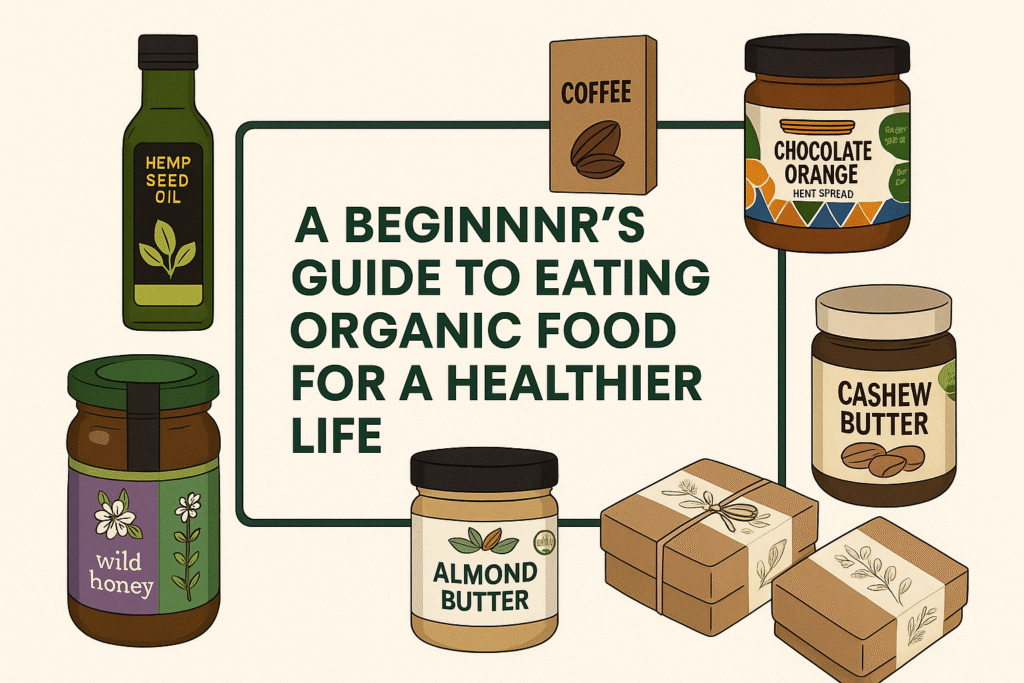In recent years more people are paying attention to their diet and the origin of their food. As awareness of health issues grows, so too does interest in Organic food — a category many people believe is beneficial to both their personal well-being as well as the environment.
This guide will provide a balanced and clear introduction to organic food for those who are new to it and wonder if it is the right choice. This guide will explain what organic food is, how it differs from conventional food and how to incorporate more healthy food to eat in your diet, whether or not you choose to go organic.
What is organic food?
Organic Food is a term used to describe products and produce that are grown or manufactured without synthetic pesticides or artificial fertilizers. It also includes genetically modified organisms or additives. Organic farming practices aim to improve soil health, biodiversity and environmental sustainability.
If you purchase organic products, you are usually buying food that was grown or raised according to strict guidelines concerning soil quality, livestock treatment and pest control.
Organic foods are often found in the following categories:
- Fruits and vegetables without chemical sprays
- Meat and poultry raised without synthetic hormones or antibiotics
- Dairy products from organically fed animals
- Organically-sourced packaged food
Why Eat Organic Food?
Organic food may not be the only way to live a healthier lifestyle, but it is a great addition to many people’s healthy eating plan. Here are some reasons:
1. Reduced Exposure to Pesticides & Additives
Organic products are often chosen by people who want to avoid synthetic pesticides and preservatives. It is especially important for children, pregnant women and those with chemical sensitivities.
2. Environmental Benefits
Organic farming is typically less intensive, encourages soil management and does not use genetically modified plants. Supporting sustainable farming can be a part of supporting organic food.
3. Animal Welfare
Animals raised organically often have more space and do not receive antibiotics as routinely. Organic meat and dairy products may be more in line with your values if you are concerned about the treatment of animals during food production.
4. A Focus on Whole Foods
Organic food encourages consumers to purchase more unprocessed, whole foods. This is an important part of a healthy lifestyle diet.
Get Started: Eat Organic on any Budget
It’s not necessary to switch to organic food all at once. Here are some practical tips to help you start adding more organic foods to your diet:
1. Start by reading the “Dirty Dozen”.
The Environmental Working Group (EWG), which publishes the Dirty Dozen list each year, recommends that you choose organic versions of the produce, such as apples, strawberries, and spinach.
2. Buy Season
Organic produce that is in season will usually be more affordable and have a fresher taste. For better prices and more fresh options, visit local farmers’ markets.
3. Prioritize Whole Foods
Start with the basics.
- Whole grains or organic oats
- Beans and legumes organic
- Fruits and vegetables
- If you consume animal products, consider buying organic eggs or dairy.
Most of these staples are cheaper than convenience foods or organic processed snacks.
4. Choose Store Brands
Most grocery stores offer their own organic products, which are often cheaper and meet the same standards as name-brands.
What are the best foods to eat? Organic or not?
Organic food is great, but the key to eating healthy is to choose nutritious foods to eat in general. A nutritious meal, whether organic or not, typically includes the following:
- Fruits and vegetables: Fill half of your plate with different colors and types.
- Whole grains : Quinoa, brown rice, whole wheat, oats and quinoa are all rich in fiber and nutrients.
- Lean protein: These include eggs, fish, poultry or tofu.
- Healthy Fats Nuts and seeds, avocados, olive oil, and avocados are all excellent sources.
- Drink plenty of water. Staying hydrated, while important for health, is something that’s often forgotten.
Eating organic food is only one aspect of a healthy lifestyle. If organic food is not always available, consider the overall quality and variety of foods instead of perfection.
Organic Food: Common Myths and Misconceptions
1. “Organic Always Means Healthier!”
Organic food is free of certain synthetic chemicals but it does not automatically make the food item nutritious. As an example, cookies and chips made from organic ingredients are still treats that should be consumed in moderation.
2. “Organic Food Has More Nutrition”
Science is divided on the issue. Some studies show small differences in nutrition, particularly antioxidants. It’s more important to eat whole, unprocessed foods that are part of a healthy diet than if they are organic.
3. “It is too expensive”
Organic products are more expensive. However, if you choose carefully, buy in bulk and focus on staples that have not been processed, it can be affordable.
Tips to Stay Consistent
It takes time to make lasting changes in your eating habits. Here are some tips that can help.
- Plan your meals ahead of time avoid impulse purchases
- Use a shopping list for a more focused experience and to reduce food waste
- Prepare meals at home to have more control over ingredients
- Try simple recipes with organic ingredients
- Be sure to read labels when purchasing packaged food that claims to be “natural”.
Final Thoughts
Eating organic foods can be an enjoyable way to care for your body, support sustainable farming, and enjoy high-quality, fresh meals. Making informed decisions that are in line with your values and lifestyle is more important than being perfect or adhering to strict rules.
Every small step you take towards a healthier lifestyle counts.

